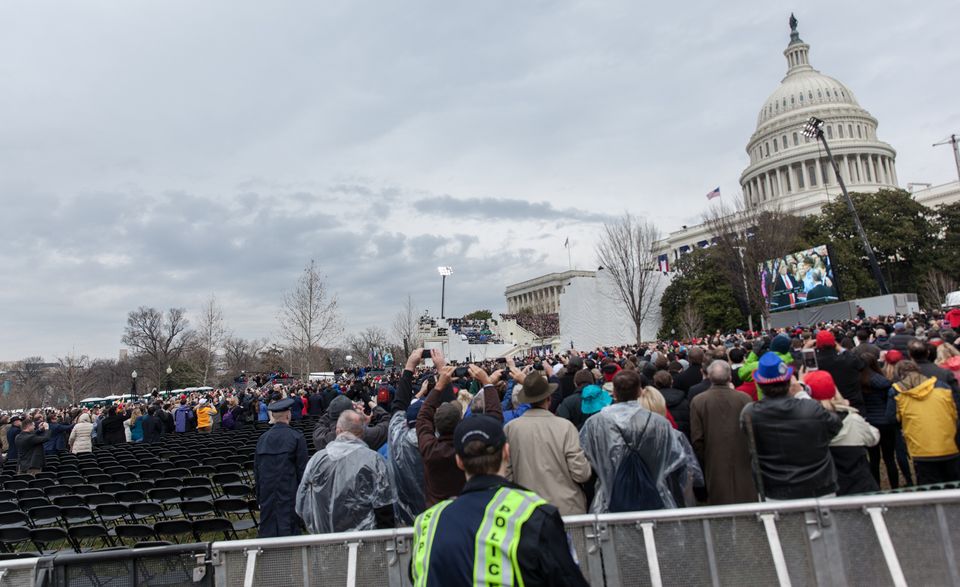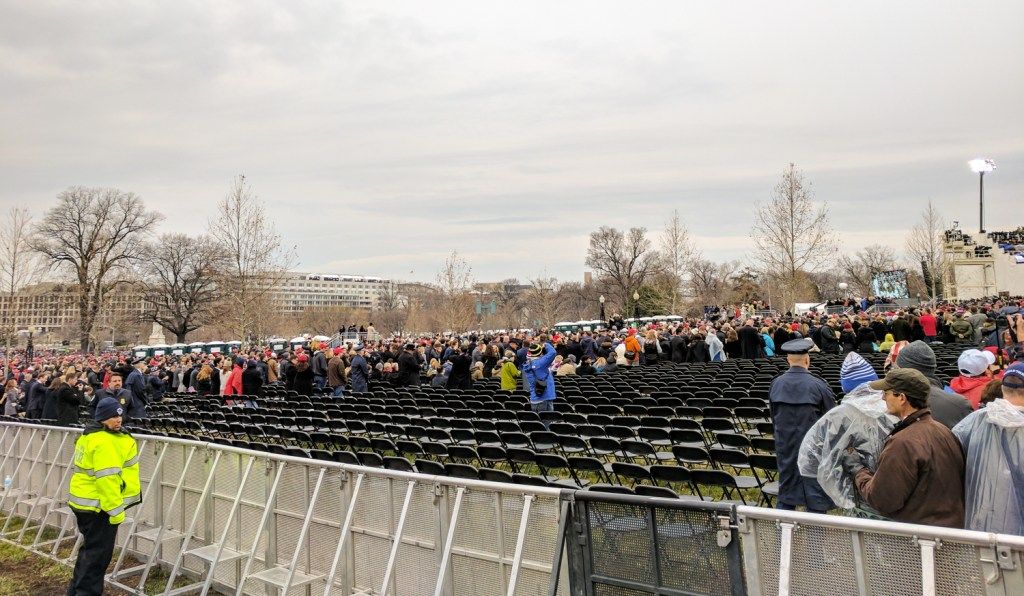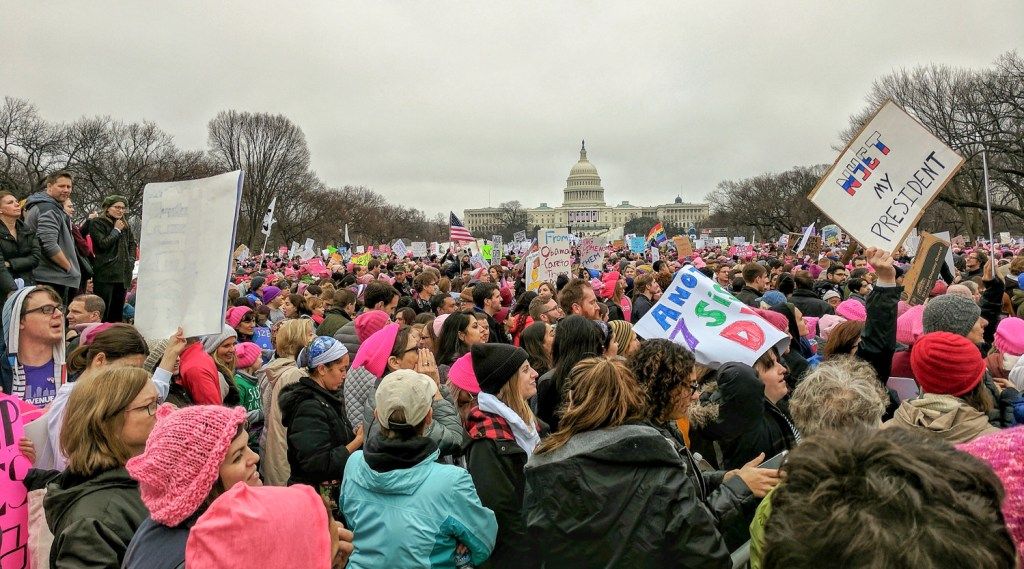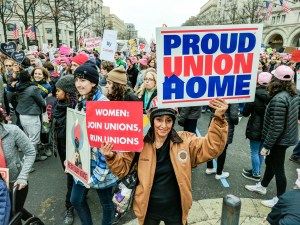Over Trump’s inaugural weekend, insecurities abound

WASHINGTON, D.C.—Donald Trump’s presidential administration began without a single reference to the cybersecurity headlines that dominated his controversial election, from assertions that the election was hacked (or “rigged”), to leaked (and “lost”) emails.
During his inaugural address, Trump mostly harped on messages he’d developed on the campaign trail, from schools “flush with cash,” to “bleak” urban streets, to “enriched” foreign businesses, to a “depletion” of the U.S. military, to demands to put “America first.”
Trump supporters seated (and standing) near me at the inauguration ceremony, meanwhile, booed Chuck Schumer (D-N.Y.) ostensibly because of his political affiliation, not his message about honoring military veterans. Perhaps it bothered them that Trump’s Electoral College victory, like George W. Bush’s first, came with an asterisk. Perhaps it bothered them that turnout for the ceremony was less robust than advertised.
Friends and strangers who had attended numerous presidential inaugurations had advised me to arrive five to six hours in advance. Although I showed up less than four hours early, I was able to casually stroll up to the edge of the fence closest to the ceremony. In front of me was a section of VIP seating that was completely empty at 9 a.m. and only a quarter full during Trump’s address.
This slideshow requires JavaScript.
Although Sean Spicer, Trump’s press secretary, suggested during his first conference the following day that at least 720,000 people had attended the inauguration—a number much smaller than his boss’ estimate during a speech to CIA agents of 1 million to 1.5 million, and much smaller than the estimated 1.8 million people who attended President Obama’s 2009 inauguration—experts’ estimates are much smaller.
After analyzing photos and videos of the National Mall and surrounding areas in the hour leading up to Trump’s inauguration speech, crowd scientists from Manchester Metropolitan University in England estimated that about 160,000 people were in attendance. They also estimated that the Women’s March on Washington, D.C., held alongside Trump’s CIA speech and Spicer’s conference, had attracted about 470,000 people to the National Mall.
Presidential anticipations
During the ceremony, I found myself positioned between two middle-aged women, both who work in education and one who had come to cheer on Trump. I asked each woman for her perspective on cybersecurity under the new president.
Sheri Henry, a white woman who teaches at Lake Superior College in Minnesota, said her email had been hacked twice. She also said her health insurer, Blue Cross Blue Shield, whose parent company, Anthem, acknowledged a data breach affecting 300,000 Minnesotans in 2015, had admitted to “accidentally” leaking her personal information.

Henry expressed confidence that Trump would appoint people who would “be good” for American cybersecurity because he is “a listener” who shows “good judgment in finding the right people who know how to do things.”
On the other side of me stood an African-American woman, with wisps of gray hair poking out from under a purple knit cap, who wanted to be identified only as Jackie from Oklahoma. A Clinton supporter, Jackie had brought her adolescent daughter to the inauguration “to teach her a lesson” about how the U.S. government handles transitions of power—and also a lesson in the importance of voting.
She said that while she’s most concerned about the high rate of incarceration of women in her home state, she’s also worried about online “bullying” and the example that Trump’s use of Twitter sets for Americans.
“Things that happen online have a trickle-down effect in the real world,” she said, her teeth chattering in the near-zero morning temperatures.
Post-inaugural concussion grenades
Shortly after the inauguration concluded, I counted about 200 people protesting across several downtown D.C. blocks police had cordoned off. Self-styled anarchists dressed in all black and full-face masks (including at least one of Guy Fawkes, popularized by the hacker collective Anonymous) lobbed rocks at police over the heads of peaceful protesters and trapped bystanders, using them as a buffer.
Several people told me that they were peacefully protesting Trump’s inauguration when police began retaliating against the masked rock throwers. A man who identified himself as Rusty from Pittsburgh said he was hit by a concussion grenade and pulled up his pant leg to reveal a fresh contusion. A 22-year-old D.C.-area student who identified herself as Kristy Garcia told me that 10 minutes before I had arrived on the scene, police had “hit a 7-year-old in the chest with a concussion grenade.” And I watched as a “street medic” flushed out a young man’s pepper-sprayed eyes with liquid antacid.
Three Trump supporters from New York state’s Orange County who were caught between protesters and police decried a lack of a “peaceful transition of power.”
One of them, wearing a baseball cap displaying Trump’s “Make America Great Again” campaign slogan, said, “There’s no justification for acting this way.” Nevertheless, they said they would stay longer to watch the clashes.
A march to remember
The Women’s March the following day, by contrast, was the largest and most peaceful protest I’ve ever seen. As participants passed by police officers, they thanked them for their service.
A chanting churn of women and men concerned about civil rights, health care, and the environment under a president who spouted misogynistic, xenophobic, and racist comments on the campaign trail generally treated Trump supporters they encountered with respect—or simply ignored them.
Signs and chants reflected the nonviolent nature of the march, but they also reflected feelings of anxiousness, anger, and resolve while displaying a command of current events and pop culture.
The sounds of “Love trumps hate,” “We will not go away; welcome to your first day,” “Show me what democracy looks like! This is what democracy looks like,” “Education is a right, not just for the rich and white,” “No fascist USA, no Trump, no KKK,” and “Nasty women, rise up!” cascaded through the crowd. As they passed the Trump International Hotel five blocks from the White House, many marchers, echoing characters in the Game of Thrones TV series, chanted “Shame! Shame! Shame!”

One Trump supporter in town with his family for the inauguration, who identified himself as Heath Victors of Florida, said a wall of marchers forced him to abort plans to visit the Smithsonian.
“I don’t know what the point of [the march] is,” he said. “These women feel they’ve been oppressed somehow, and people’ve gone on their bandwagon. I don’t think there’s any intentional oppression.”
When I pointed out that many women surrounding him clearly disagree with that sentiment, he shrugged. His wife declined to comment.
Victors said his support of Trump is rooted, at least in part, in his hopes that Trump would shrink the federal government.
“I think Trump’s an anarchist,” he said. “The idea of downsizing government is good, in my mind.”
Before I could ask how Trump’s anarchy compared to that of the masked protesters antagonizing the heavily armed police the prior day, a sea of marchers had carried us off in different directions.
Many marchers carried signs featuring the words, “A woman’s place is with the Resistance,” over a photo of the recently deceased Carrie Fisher in her iconic role as Star Wars’ Princess Leia. Some carried signs reading, “Donny, you’re out of your element,” a reference to the cult film, The Big Lebowski.

Others displayed messages such as “Free Melania,” “Yes we can, yes we did, yes we will,” “Women’s rights are human rights,” “Nyet my president,” “Girls just want to have fundamental rights,” “I’ll pee on you if you resign,” “Keep your tiny hands off my human rights,” and “Pussy grabs back,” a reference to misogynistic comments made by Trump in 2005 that inspired the knitting (and wearing) of millions of pink cat hats around the globe.
One of the more provocative signs on display, held by an elderly marcher and widely shared on social media, read, “I can’t believe I still have to protest this fucking shit.”
Marchers’ signs and chants scarcely addressed growing concerns about cybersecurity and privacy amid revelations of widespread hacks and leaks of U.S. government records. But after remarking that the Trump administration had just scrubbed any mention of climate change and LGBTQ rights from the White House website, another elderly marcher, Juliet Thomas of Illinois, said “people need to be more aware” than ever of ways to guard their online security.
“We don’t have to wait for Trump to do anything to worry about our security,” she said, noting that she uses WhatsApp, which encrypts its users’ messages end to end, to speak with her daughter in Europe.
“We need cybersecurity to protect us from the demise of democracy,” she said.
